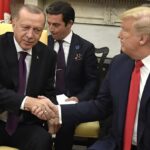Summary and Additional Remarks by News About Turkey (NAT)
The article titled “Turkey and the Syrian Conundrum after Assad: A Test for Ankara’s Capacity and Credibility,” authored by Riccardo Gasco and Samuele Abrami, provides a comprehensive analysis of Turkey’s evolving role and challenges in Syria following the fall of the Assad regime. The report outlines the significant developments and their implications for Turkey’s domestic and international standing.
The recent developments in Syria saw opposition forces, supported by Turkey and other Islamist groups, launch a coordinated offensive that led to the rapid collapse of Assad’s regime in December 2024. The Syrian National Army (SNA) and Hayat Tahrir al-Sham (HTS) played pivotal roles in this transformation, raising questions about Turkey’s influence and intentions due to its ties to these groups.
In the aftermath, Turkey has emerged as a prominent regional power, benefiting strategically from Assad’s removal. The collapse of the regime has diminished the influence of Kurdish militias and weakened the footholds of Russia and Iran in Syria. Ankara has expressed support for UN Security Council resolution 2254, which emphasizes Syria’s sovereignty and territorial integrity. Simultaneously, Turkey has leveraged its connections with rebel forces to strengthen its position in the region.
Domestically, the developments in Syria provide Turkey with an opportunity to address internal political challenges. The return of Syrian refugees to their homeland could alleviate widespread public discontent, as hosting millions of Syrians has become a significant political liability for the ruling government. Additionally, the Turkish government is making efforts to address the Kurdish issue by proposing reconciliation initiatives, such as involving PKK leader Abdullah Öcalan, as a strategic move to gain political leverage in upcoming elections.
Regionally and globally, Turkey continues to navigate complex relationships with the U.S., Russia, and the EU while managing its operations in northern Syria. It views U.S.-backed Kurdish groups like the SDF as significant threats and is actively working to counter their influence. However, the regional stability remains fragile, with Turkey facing challenges involving other key stakeholders, including Israel and Iran.
Looking ahead, Turkey is positioned as a central player in shaping post-Assad Syria. However, it faces the critical challenge of balancing proactive involvement with avoiding unilateral actions that could destabilize the region further. The potential success of HTS in gaining international legitimacy could bolster Turkey’s role in Syria’s reconstruction and governance, but this comes with inherent risks. The authors argue that Turkey’s ability to effectively manage these domestic and international complexities will ultimately determine its credibility and leadership as a regional power. Stability in Syria remains the overarching goal, but achieving it will require careful and measured strategies from Ankara.
Read more here.



